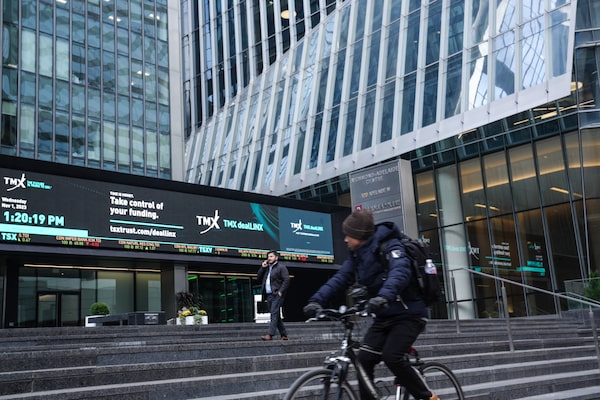
People pass the exterior of the TMX in Toronto, Nov. 1, 2023. Merger and acquisition activity in Canada has dropped in Canada, but some market watchers expect deal-making activity to pick up later this year if recession fears continue to diminish and private equity investors face pressure to deploy saved-up capital.Chris Young/The Canadian Press
Deal-making all but dried up in Canada during the first three months of 2024, despite hot stock markets and a rebound in mergers and acquisitions globally.
M&A involving Canadian businesses amounted to US$28.1-billion during the first quarter, according to data from financial data service Refinitiv. It marks a 23-per-cent decline from the same period in 2023 and nearly 55 per cent below the 10-year first-quarter average of US$62.1-billion.
Stock sales amounted to nearly $5-billion in the first quarter. That’s less than half the 10-year average of $10.1-billion, but a rebound from the extremely low level of $1.9-billion in the first quarter last year.
There was a glimmer of optimism in the debt market, however, as Canadian businesses raised $21.4-billion through deals during the first quarter – a 35-per-cent increase from the start of 2023, and more than 28 per cent above the 10-year first-quarter average.
“The data is mixed and a bit confusing,” said Jeremy Fraiberg, co-chair of the mergers and acquisitions practice at Osler, Hoskin & Harcourt LLP – the top legal adviser for M&A in Canada during the quarter – in an interview.
“The stock market is doing well; interest rates are stabilizing, and there may even be cuts soon; bond markets are reacting positively; you’ve got all this dry powder in private equity, and people need to transact. But have the floodgates opened? Not quite yet.”
Nitin Babbar, global co-head of equity capital markets at Royal Bank of Canada, which was the top investment bank for stock deals in the first quarter, said pending rate cuts have already been priced into the equity trading environment.
“Markets are a number of quarters ahead of actual events, and so the expectation of rate cuts is already embedded into this market,” Mr. Babbar said. “People are more relaxed about some of the inflation numbers, and, for that reason, equities have been extremely well bid.”
Two of the best examples demonstrating some investor enthusiasm during the first quarter, he said, were GFL Environmental Inc.’s GFL-T $982-million secondary offering of stock in March and First Quantum Minerals Ltd.’s FM-T $1.15-billion bought-deal offering in February.
However, there were zero initial public offerings during the quarter, as the IPO market remained stalled. That follows 2023, which was the worst year since at least 1994 for the Canadian IPO market.
Mr. Babbar said the stall should be viewed in a broader context: “Over time, IPOs represent between 10 and 15 per cent of Canadian equity market activity, so it is important but not the fundamental driver,” he said.
“You’re also seeing the U.S. market come back to life for IPOs, and I think that is always a precursor for life in other markets, including Canada.”
He added: “There are a number of private companies who, during 2021 and 2022, had paused on considering the public markets, but with the strength we are seeing now, many are looking more closely at an IPO.”
As for M&A, expectations are that deal-making will pick back up later this year if recession fears continue to diminish, according to David Rawlings, chief executive of JP Morgan Canada, which was the top financial adviser for M&A in the first quarter.
“CEO confidence is what drives deal activity, and I think we are in an environment where, for the last 18 to 24 months, everyone has been waiting for this recession that just hasn’t come,” he said.
“That doesn’t mean that we shouldn’t still be a little cautious, but the cycle just keeps on extending. So we would argue that the longer the cycle extends, the more daylight there is where CEOs might say, ‘Actually, we might get through the next 12 to 18 months without a recession.’”
Osler’s Mr. Fraiberg said private equity investors are also under increasing pressure to deploy their capital, which should also boost M&A activity in the months ahead.
“There is an enormous amount of pent up demand in the private equity system,” he said. “The question is whether we are seeing it yet and the answer is, no, we are not seeing it yet. But everyone is expecting it to come.”